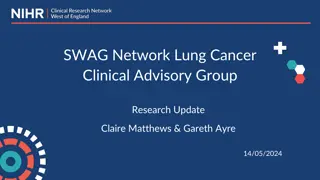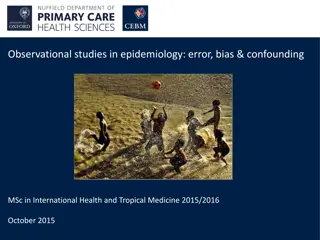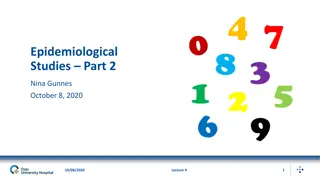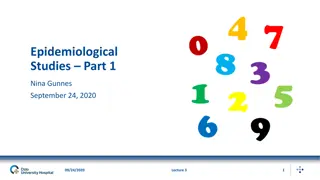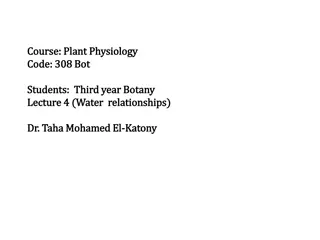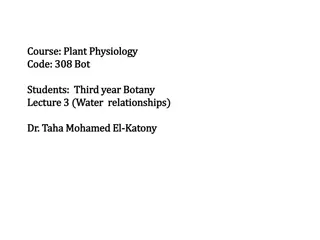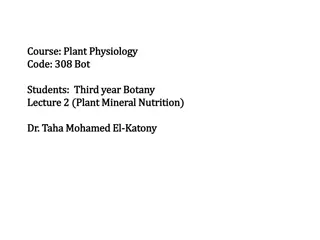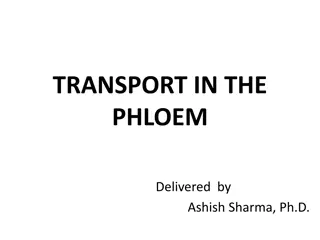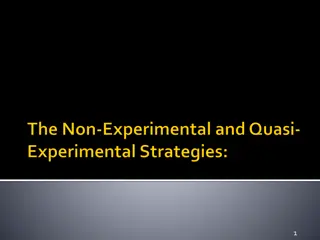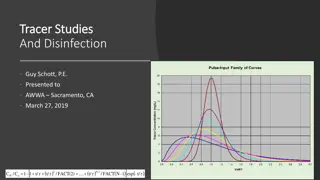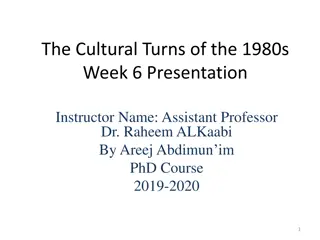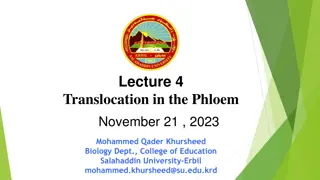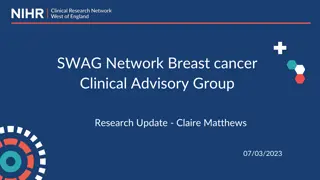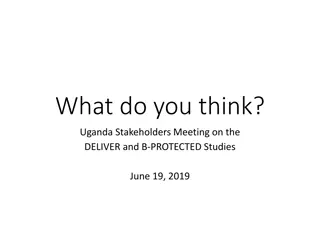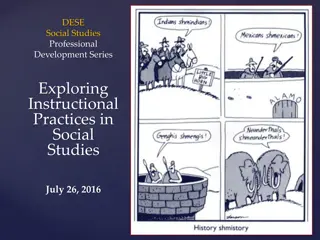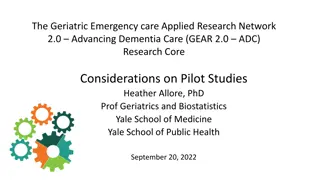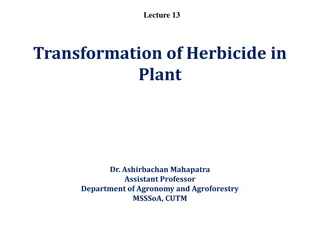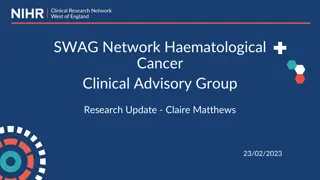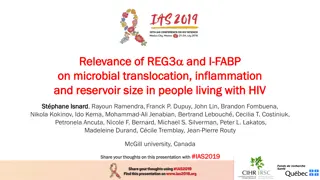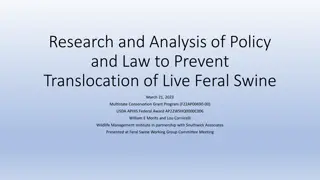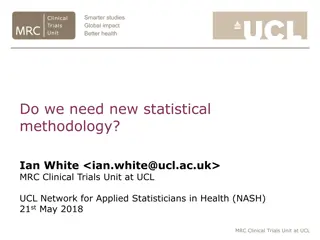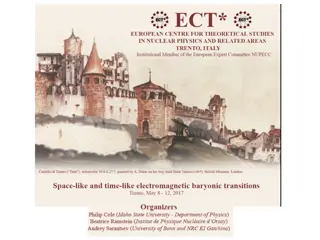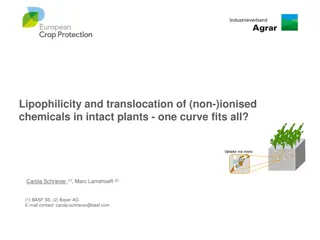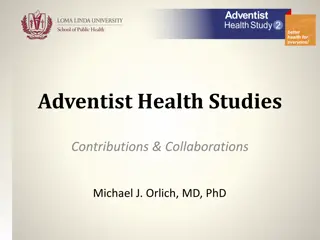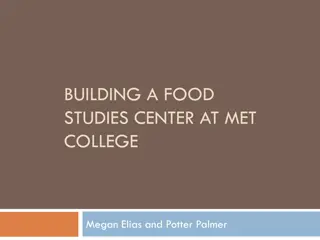Remarkable Opportunities in Higher studies after Civil Engineering
Higher studies after Civil Engineering in Tamil Nadu\nCivil engineering stands at the forefront of shaping our physical environment; from the infrastructure we rely on daily to the sustainable development of our cities. Further, pursuing Higher studies after Civil Engineering opens up countless oppo
0 views • 2 slides
Latest Research and Studies on Lung Cancer - Update May 2024
This research update includes information on national recruitment to lung cancer studies, comparison of national vs. regional recruitment, and detailed descriptions of various studies and trials related to lung cancer. The studies cover areas such as treatment advancements, observational studies, ma
2 views • 13 slides
Understanding Observational Studies in Epidemiology
Delve into the realm of observational studies in epidemiology, exploring concepts such as error, bias, and confounding. Discover the significance of various study designs, from case reports to prospective cohort studies, in elucidating associations and establishing causality in non-communicable dise
0 views • 58 slides
Overview of Cohort Studies in Epidemiology
Cohort studies are a type of observational study where a group of healthy subjects is followed over time to investigate relationships between exposures and outcomes. They provide valuable insights into disease development and risk factors, offering advantages like assessing multiple exposures and en
0 views • 21 slides
Overview of Ecological Studies in Epidemiology
Ecological studies in epidemiology involve studying groups of individuals at a population level to examine the correlation between exposure and disease occurrence. While cost-effective and useful for generating hypotheses, ecological studies have limitations, such as the inability to control for con
3 views • 21 slides
Chromosomal Alterations and Their Impact on Phenotype
Errors in mitosis or meiosis can result in changes in phenotype, often due to alterations in chromosome structure such as deletion, duplication, inversion, and translocation. Nondisjunction can lead to abnormal chromosome number, resulting in disorders like aneuploidy. Polyploidy, with extra complet
0 views • 9 slides
Understanding Water Relationships in Plant Physiology
Water plays a crucial role in the physiology of plants, with most absorbed water being translocated to leaves and lost through transpiration and guttation. While essential for turgidity and mineral translocation, plant water use is often inefficient. Transpiration is the primary mode of water loss,
3 views • 22 slides
Understanding Root Pressure in Plant Physiology
Root pressure is the pressure developing in xylem vessels due to metabolic activities of the roots. It is an active process driven by osmotic mechanisms and the absorption of salts by the roots. This pressure plays a key role in translocation of water, affecting factors like respiration, exudation r
1 views • 20 slides
BSc in Strategic Studies & International Relations at KDU
The Faculty of Defence and Strategic Studies at KDU offers a hybrid BSc degree in Strategic Studies and International Relations to prepare skilled professionals in national security and foreign relations. The program aims to develop theoretical and research skills for analyzing international politic
0 views • 8 slides
Overview of Media Studies Disciplines and Historical Development
Media studies is a multidisciplinary field that explores the content, history, and effects of various media, with roots in the relationship between media and culture. Originating in the 1920s, media studies draws on traditions from social sciences and humanities, incorporating theories from discipli
5 views • 18 slides
Plant Mineral Nutrition: Absorption and Circulation of Ions in Roots
Plant mineral nutrition involves the absorption and translocation of ions across roots. Salts are absorbed passively and actively, with ions moving into the root's apoplasm via free diffusion. The Casparian strip in endodermal cells acts as a barrier, allowing ions to pass only through the protoplas
0 views • 27 slides
Transport in the Phloem: A Detailed Overview by Ashish Sharma, Ph.D.
The phloem plays a vital role in transporting sugars and organic materials throughout plants. This system involves various specialized cells like sieve elements, companion cells, parenchyma cells, and phloem fibers. Mature sieve elements lack certain organelles and have non-lignified cell walls, mak
7 views • 32 slides
Understanding Post-Authorisation Safety Studies (PASS) in Pharmacovigilance
Post-Authorisation Safety Studies (PASS) are conducted after a medicinal product is authorized to gather more safety information or assess risk management effectiveness. These studies evaluate the safety and benefit-risk profile of the product, aiding regulatory decision-making. PASS aims to identif
0 views • 4 slides
Understanding Nonexperimental and Quasi-experimental Studies
Nonexperimental and quasi-experimental studies resemble experiments but lack random assignment, making them valuable for group comparisons without establishing causation. This type of research design looks at differences between groups that already exist, focusing on group differences rather than ca
1 views • 35 slides
Understanding Tracer Studies and Disinfection in Water Treatment
Tracer studies play a crucial role in determining hydraulic efficiencies and disinfectant exposure times in water treatment processes. This presentation by Guy Schott covers the purpose of tracer studies, water age distribution, disinfection exposure time, CT disinfection, log inactivation, and more
0 views • 34 slides
The Cultural Turns of the 1980s in Translation Studies
This presentation explores the various cultural turns in Translation Studies during the 1980s, highlighting key scholars such as Snell-Hornby and Even-Zohar. It discusses the linguistic turn, pragmatic turn, and the significance of cultural studies in understanding translation processes, particularl
0 views • 30 slides
Mechanisms of Nutrient Uptake by Microbial Cells
Nutrient uptake by microbial cells involves various transport mechanisms such as passive diffusion, facilitated diffusion, active transport, and group translocation. These mechanisms ensure the specific acquisition of required nutrients by the cell through the selectively permeable plasma membrane.
3 views • 15 slides
Understanding Clinical Trials: Types and Designs
Clinical trials are essential research studies that evaluate new tests and treatments to improve human health outcomes. They involve various phases, designs, and purposes, such as treatment trials, prevention trials, and observational studies. Different types of clinical trial designs include experi
7 views • 18 slides
Understanding Translocation in the Phloem
This lecture explores the process of translocation in the phloem, supported by evidence from studies such as aphid experiments, ringing experiments, and the use of radioactive isotopes. It delves into the materials translocated in phloem sap, including water, sucrose, non-reducing sugars, nitrogen c
5 views • 18 slides
Breast Cancer Research Updates and Recruitment Data Overview
This document provides updates on breast cancer research, focusing on recruitment data and studies conducted between 2019 and 2023. It includes information on national and regional recruitment to breast cancer studies, SWAG region lead network studies, and opened breast cancer studies in 2022/2023.
0 views • 13 slides
Uganda Stakeholders Meeting on DELIVER and B-PROTECTED Studies - June 19, 2019
Stakeholders in Uganda convened on June 19, 2019, to discuss the DELIVER and B-PROTECTED studies evaluating PrEP and the dapivirine ring in pregnant and breastfeeding women. The discussions included concerns about community involvement, reasons why women may hesitate to join the studies, and the enr
0 views • 9 slides
Exploring Social Studies Instructional Practices: Professional Development Series
Join the DESE Social Studies Professional Development Series to delve into instructional practices in social studies. Connect with educators, explore pedagogy, and engage in hands-on activities like the Elephant and Giraffe exercise. Learn from ELA directors, Missouri Writing Project experts, and Ar
0 views • 14 slides
Pilot Studies in Advancing Dementia Care: Core Considerations
Pilot studies play a crucial role in exploring interventions, determining necessary modifications, assessing feasibility, and confirming stakeholder acceptance. They help in testing study protocols, assessing data collection procedures, and evaluating outcome measures. Feasibility studies are essent
0 views • 9 slides
Understanding Down Syndrome: Types, Characteristics, and Impacts
Down syndrome is a genetic condition caused by an extra chromosome, typically chromosome 21. This leads to physical and cognitive challenges, with individuals exhibiting unique abilities. The syndrome presents with distinctive physical features, such as flattened face, almond-shaped eyes, and poor m
2 views • 14 slides
Herbicide Absorption and Translocation Mechanisms in Plants
Herbicides need to be effectively absorbed and translocated within plants to interfere with physiological and biochemical processes. Soil-applied herbicides are absorbed by roots, shoots, and seeds through different mechanisms, while foliage-applied herbicides enter through the cuticle, stomata, and
0 views • 7 slides
Hematological Cancer Clinical Studies Update and Recruitment Statistics
Latest update on hematological cancer clinical studies from the SWAG.Network Haematological Cancer Clinical Advisory Group, including national recruitment data, regional recruitment comparisons, open studies, and sample size information for ongoing studies. This comprehensive update covers a range o
0 views • 14 slides
Choosing Between Observational Study and Experiment in Research
Observational studies involve recording data without interfering with subjects, while experiments impose treatments on subjects to establish cause and effect. A well-controlled experiment is crucial for determining causation, while observational studies can provide quick results at lower costs. Each
0 views • 24 slides
Role of REG3 and I-FABP in HIV-Related Gut Permeability and Inflammation
This presentation highlights the significance of Regenerating Islet-Derived Protein-3 (REG3) and Intestinal Fatty Acid Binding Protein (I-FABP) in microbial translocation, inflammation, and reservoir size in individuals living with HIV. REG3 and I-FABP serve as markers of gut epithelial damage and p
0 views • 7 slides
Comprehensive Analysis of Policies and Laws on Feral Swine Translocation
Research and analysis conducted to assess the statutes, regulations, and policies relating to the translocation of live feral swine across all 50 U.S. states. The study aimed to enhance uniformity and effectiveness by providing recommendations based on state wildlife agency responses, surveys, and l
0 views • 12 slides
The Need for New Statistical Methodology in Health Studies
The discussion centers around the necessity for advancements in statistical methodology, particularly in trials, observational studies, and meta-analysis. The role of statisticians in interpreting data, designing studies, and addressing missing data is highlighted. The importance of understanding ex
0 views • 19 slides
Advances in Baryon Spectroscopy and Hadronic Matter Studies
Discussions at the meeting focused on interpreting HADES results for e+e- and meson production in hadronic reactions, with studies involving proton, pion, light, and heavy ion beams. The role of time-like electromagnetic transitions, baryon spectroscopy, and connecting hadronic matter studies were e
0 views • 12 slides
Recent Updates and Achievements in International Affairs and Studies
In April 2014, significant developments occurred in international affairs and studies, including visits to American University in Dubai, student mobility programs with Universiti Malaysia Pahang, and enrollment increases for Fall 2014. The Office of Graduate Studies also saw improvements in technica
0 views • 9 slides
Sponsor Expectations for Clinical Studies at Thomas Jefferson University
This presentation discusses the sponsor expectations for clinical studies, investigator responsibilities, TJU's strengths in conducting studies, and how principal investigators can impress sponsors. Topics include assessment of investigator performance, regulatory guidelines, streamlining processes,
0 views • 11 slides
Lipophilicity and Translocation of Chemicals in Plants: Exploring the Relationship Between Log.D and TSCF
A study investigates the correlation between the lipophilicity of chemicals and their translocation in intact plants. The focus is on the relationship between log.D values and the Transpiration Stream Concentration Factor (TSCF). Various curves are proposed to describe this relationship, aiming to r
0 views • 9 slides
Understanding Targeted Clinical Investigation in Pharmacovigilance
Targeted clinical investigation plays a crucial role in pharmacovigilance by further evaluating significant risks identified in pre-approval clinical trials. This involves conducting pharmacokinetic and pharmacodynamic studies, genetic testing, interaction studies, and large simplified trials to ass
0 views • 12 slides
Concentration and Minor Requirements for Bachelor of General Studies (BGS)
Bachelor of General Studies (BGS) students at Northwestern State University of Louisiana must complete a concentration consisting of 36 hours, with a minimum of 12 hours at the 3000 and 4000 levels taken at NSU. The popular concentrations are Social Science, Computer & Natural Science, and Arts & Co
0 views • 9 slides
Exploring Pesticide Monitoring and Contamination Studies in Maine
Mary Tomlinson's work with the Maine Board of Pesticides Control includes past studies on groundwater and surface water monitoring, ongoing monitoring initiatives, and future collaborative studies. The State Law mandates residue surveys to identify possible contamination sources and develop a pestic
1 views • 55 slides
Adventist Health Studies Contributions & Collaborations Overview
Adventist Health Studies have made significant contributions to understanding the health and longevity advantages of Seventh-day Adventists, particularly focusing on vegetarian diets and cardiovascular health. With a history spanning over 57 years and various cohort studies, these studies have provi
0 views • 12 slides
Understanding Chromosomal and Gene Mutations in Genetics
Chromosomal and gene mutations play a crucial role in genetic variations. Mutations such as insertion, deletion, and substitution can lead to significant changes in DNA sequences, affecting gene expression and cellular functions. Additionally, chromosomal mutations like deletion, amplification, inve
0 views • 15 slides
Building a Food Studies Center at Met College
Establishing a Food Studies Center at Met College, driven by the merging of Food and Wine courses with Gastronomy programs, aims to integrate hands-on and academic approaches to food studies. Drawing inspiration from existing models like the Culinaria Research Centre and the Center for Regional Agri
2 views • 8 slides

